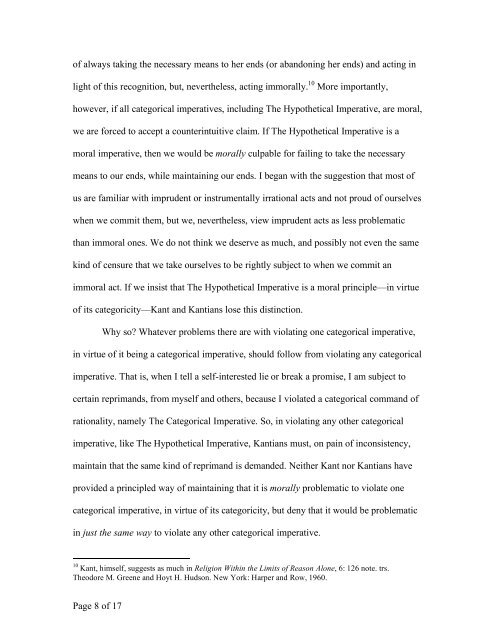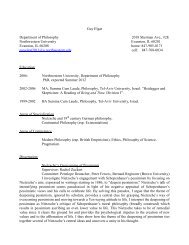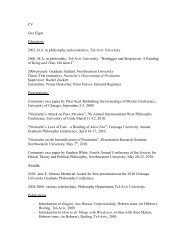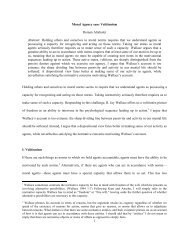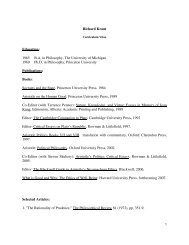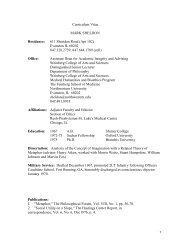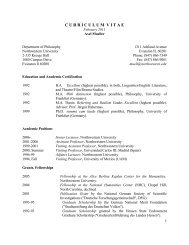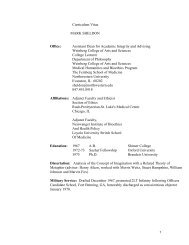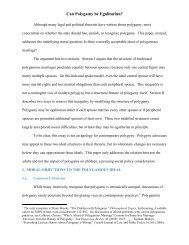On the Kantian Distinction between Prudential and Moral Commands
On the Kantian Distinction between Prudential and Moral Commands
On the Kantian Distinction between Prudential and Moral Commands
You also want an ePaper? Increase the reach of your titles
YUMPU automatically turns print PDFs into web optimized ePapers that Google loves.
of always taking <strong>the</strong> necessary means to her ends (or ab<strong>and</strong>oning her ends) <strong>and</strong> acting in<br />
light of this recognition, but, never<strong>the</strong>less, acting immorally. 10 More importantly,<br />
however, if all categorical imperatives, including The Hypo<strong>the</strong>tical Imperative, are moral,<br />
we are forced to accept a counterintuitive claim. If The Hypo<strong>the</strong>tical Imperative is a<br />
moral imperative, <strong>the</strong>n we would be morally culpable for failing to take <strong>the</strong> necessary<br />
means to our ends, while maintaining our ends. I began with <strong>the</strong> suggestion that most of<br />
us are familiar with imprudent or instrumentally irrational acts <strong>and</strong> not proud of ourselves<br />
when we commit <strong>the</strong>m, but we, never<strong>the</strong>less, view imprudent acts as less problematic<br />
than immoral ones. We do not think we deserve as much, <strong>and</strong> possibly not even <strong>the</strong> same<br />
kind of censure that we take ourselves to be rightly subject to when we commit an<br />
immoral act. If we insist that The Hypo<strong>the</strong>tical Imperative is a moral principle—in virtue<br />
of its categoricity—Kant <strong>and</strong> <strong>Kantian</strong>s lose this distinction.<br />
Why so? Whatever problems <strong>the</strong>re are with violating one categorical imperative,<br />
in virtue of it being a categorical imperative, should follow from violating any categorical<br />
imperative. That is, when I tell a self-interested lie or break a promise, I am subject to<br />
certain reprim<strong>and</strong>s, from myself <strong>and</strong> o<strong>the</strong>rs, because I violated a categorical comm<strong>and</strong> of<br />
rationality, namely The Categorical Imperative. So, in violating any o<strong>the</strong>r categorical<br />
imperative, like The Hypo<strong>the</strong>tical Imperative, <strong>Kantian</strong>s must, on pain of inconsistency,<br />
maintain that <strong>the</strong> same kind of reprim<strong>and</strong> is dem<strong>and</strong>ed. Nei<strong>the</strong>r Kant nor <strong>Kantian</strong>s have<br />
provided a principled way of maintaining that it is morally problematic to violate one<br />
categorical imperative, in virtue of its categoricity, but deny that it would be problematic<br />
in just <strong>the</strong> same way to violate any o<strong>the</strong>r categorical imperative.<br />
10 Kant, himself, suggests as much in Religion Within <strong>the</strong> Limits of Reason Alone, 6: 126 note. trs.<br />
Theodore M. Greene <strong>and</strong> Hoyt H. Hudson. New York: Harper <strong>and</strong> Row, 1960.<br />
Page 8 of 17


